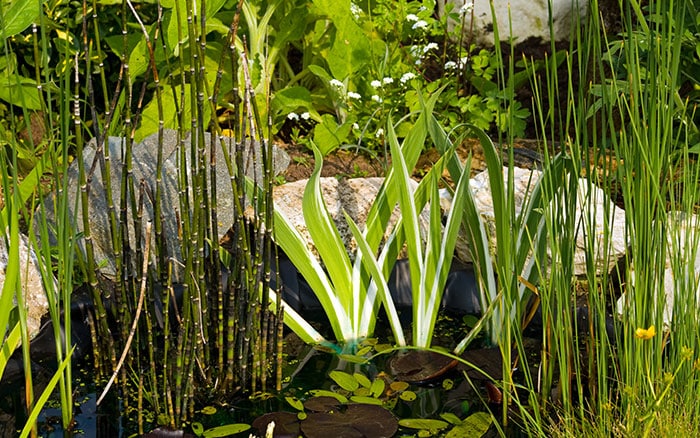Guarantee that your garden pond will be a colourful paradise by planting marginal plants this June. Not only will they make your pond look beautiful, but it is good for the water too.
What are marginal plants?
Marginal plants are aquatic plants that grow well in various depths of water, from 5cm up to 15cm, with their roots under water, with their leaves and flowers above water.
This makes them ideal choices for softening pond edges, making the pond look more natural, and helping it blend into the wider landscape of the garden.
They can also be planted directly into streams. Some actually help naturally filter areas of water!
There are native and non-native marginals for full sun or part shade with a wide range of different flower colours. Native plants such as Frogbit (Hydrocharis morass-range) and the Flowering Rush (Butomus umbellatus) are particularly good for attracting wildlife. In fact, many pollinating insects have evolved with native plants to be a perfect match for each other!
How do you choose marginal plants?

When choosing marginal plants try to choose a selection in the same way as if you were designing a flower border, with unified colour schemes and contrasting textures.
Specialist pond suppliers usually sell the plants in aquatic pots. These are containers with numerous holes on all four sides as well as the underside and are designed to let water flow in and roots spread out into the water. It’s best to fill them with aquatic rather than general-purpose compost, as aquatic compost is very low in nutrients, (to help stop algae that turn pond water green forming), and heavy, to help keep the container below water.
How to plant marginal plants
Soak the filled basket in a container full of rainwater before planting to absorb enough water to hold the whole plant in place; top with a layer of grit, to help stabilise the compost under it, and then lower the basket slowly into the pond onto the planting ledge or water’s edge.
Marginal plants for June planting
Iris pseudacorus (Yellow flag iris)
A UK native, this is a great choice if you have a large pond in a sunny aspect. The cheerful, bright yellow flowers appear in late spring and look fantastic planted together in drifts directly into boggy clay or underwater in aquatic baskets. To keep them flowering well and under control, divide the plants every two years just after flowering.

- Flowers May to July
- Hardy
- Grows to 1.5m tall and 1.5m wide
- Dappled shade to full sun
- Exposed or sheltered
Ranunculus aquatilis (Water crowfoot)
As previously mentioned it’s important to keep the water oxygenated and another UK native that does this well is the Water crowfoot.
This no-maintenance plant attracts many pollinating insects such as butterflies, bees, and hoverflies. Most of its foliage remains underwater with some leaves and all of the flowers appearing above water in May. It will grow well in fast-flowing or still water.

- Flowers May to September
- Hardy
- Grows to 50cm tall and 20cm wide
- Full sun to part shade
- Exposed
Mentha aquatica (Water mint)
Water mint is another very easy-to-grow marginal which will grow happily in the shade. Plus, it has the added benefit of sweetly-scented leaves when crushed. It is an extremely vigorous grower and so is best suited to larger ponds and grown in an aquatic basket.

- Flowers June to September
- Hardy
- Grows to 30cm tall and 50cm wide
- Full sun to dappled shade
- Exposed
Cyperus papyrus (Egyptian paper rush)
If you want to add an exciting touch to your pond edge, Egyptian paper rush is the perfect choice. It’s tender, so you’ll probably need to grow it in an aquatic basket. Cut back leaves in autumn and move into a frost-free, position somewhere like a greenhouse with the basket resting in rainwater, and return to the pond area once all risk of frost has passed.

- Flowers May to June
- Tender
- Grows to 250cm tall and 100cm wide
- Full sun to part shade
- Sheltered
Pontederia cordata (Pickerel weed)
A wonderful marginal plant for late summer colour is Pickerel weed. It has handsome, broad, sword-shaped leaves and becomes covered in masses of bright purple-blue flowers.

- Flowers July to September
- Hardy
- Grows to 120cm tall and 75cm wide
- Full sun
- Exposed
Ensuring that your garden pond looks natural in your outdoor space can be done effortlessly with marginal plants. Your pond will look more colourful and comfortable in your garden instantly.

Leave A Comment